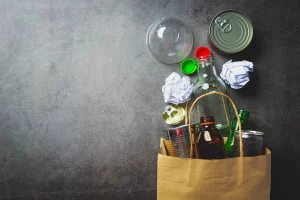 Cleaning your house is of crucial importance. If you want to live in a clean, healthy, and organised home, you should have a regular cleaning schedule to stick to. By tackling big and small jobs around the house, you will eventually reduce the amount of grime and dirt, creating a safe space for yourself and your loved ones.
Cleaning your house is of crucial importance. If you want to live in a clean, healthy, and organised home, you should have a regular cleaning schedule to stick to. By tackling big and small jobs around the house, you will eventually reduce the amount of grime and dirt, creating a safe space for yourself and your loved ones.
However, cleaning and organising can be tricky. Of course, the daily or weekly dusting and mopping we do is not a big deal but whenever it is time to tackle the annual spring (deep) cleaning of the house there will be clutter and random items to be taken care of. It is a big job and we would like to help you find a way to deal with it in a simple and efficient manner. We will talk about recycling and how to dispose of various items around the house properly.
While nowadays, more people are interested in sustainable living and recycling, most have no clue that this goes beyond plastic bottles and cans. This, of course, is amazing and some countries do, in fact, have machines that will give you cash whenever you dispose of cans and bottles, you can go the extra mile and recycle a lot more. Every little bit of recycling you can do helps the environment in major ways. The more junk we keep out of landfills, the less probable it is that waste will enter our waterways and damage sea life. The more we recycle, the more we save already scarce natural resources.
Keep reading to find out what can be recycled and where and how to dispose of it.
Batteries
While ordinary alkaline, manganese, and carbon-zinc batteries are not considered hazardous and can be thrown away in the ordinary garbage bin, it is better that you recycle them. They can be used to make a lot of other items, especially metal ones. Lithium and button batteries that are single-use or rechargeable should always be recycled.
- A lot of supermarkets, food stores, and tech stores have places that collect used batteries and recycle them. If you are not sure where to put them, ask an employee.
- Ikea stores also take batteries for recycling.
Books
Books are made of paper and are perfect for recycling. Even though most people read e-books, who does not love a physical copy that smells of paper and old libraries? If you are renovating or decluttering at home and you have a lot of books you will no longer read, collect them in a box and donate them. You can give them to a shelter or a charity organisation, you can donate them to a local library or give them away to a second-hand book store. If you would like to make some money off your precious books, sell them online.
Lights and bulbs
The type of light or bulb dictates how and where it is recycled. Incandescent and LED bulbs can be discarded in the garbage, but not all recycling centres accept them. Other types of bulbs may be considered hazardous due to mercury traces within the bulb and must be handled and discarded with caution. It is best to ask someone in an e-store. They will know where those can be disposed of. If you are already in the recycling centre, ask the employees there.
Cell phones
With new models quickly showing up on the market, people quickly replace their old phones. Cell phones are a big source of garbage. Those can actually be recycled (even if they are no longer working). While Apple stores will accept any of their products back (those include iPads, iPods, iPhones, MacBooks, etc.), other tech stores can also take your used devices and even give you credit for the store. Make sure you mention whether the phone is working or not. Working phones will be cleared of data and passed down by people in shelters, refugees, and other people in need.
Clothes
The old clothes at the bottom of your closet can be worn once again. There are always people in need that will be more than grateful to receive a new set of warm clothes (even if they do not match today’s fashion). If you are decluttering your wardrobe, collect the clothes that can be worn (make sure they are clean and do not have missing buttons, holes, etc.). You can organise them in different boxes – one for children, one for males, one for females. Or separate the clothes by type – winter wear, jackets, summer clothing, etc.
You can give those to a local charity organisation, to a Red Cross centre, or give them to a second-hand store nearby.
Furniture
Whenever you are renovating, keep in mind that not everyone can afford to refurbish their house. If you have a bunch of furniture you plan on replacing, do not rush to throw it away. While the simplest way to get rid of it but still give it a chance is placing it outside your house so someone can take it, you can actually donate it to a local charity centre or a shelter. You can even sell it online.
